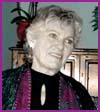 Listening to the Heart by Carol Hwoschinsky
Listening to the Heart by Carol Hwoschinsky
I am sitting in a hotel lobby in east Jerusalem listening to a small, quiet man tell us how his son was abducted and executed by a group of Palestinians. He recounts how he, an Israeli Jew, reached out to connect first with the parents of the young man who had killed his own son, and then formed a support group for bereaved Jewish and Arab parents.
I am in a Palestinian refugee camp listening to a man tell us of his family’s decision to donate the body parts of his dead son. The Jewish doctor reminded him that because his son had died in an Israeli hospital, his son’s parts would most likely be used for Israeli Jews. Our host exclaimed over and over that humans are humans and that whether one is a Jew or a Palestinian doesn’t matter at times like these.
Often, when listening to Jews and Palestinians, I cannot distinguish the concerns and needs of one from another. I hear the need for security, safety, homeland, prosperity and the right to raise one’s family with dignity. Isn’t this what we all want? This failure to hear and to recognize our interconnection and the common basic needs is what leads to conflict: the projection of our fears on to the “other”.
I have had the good fortune to go to Israel and the Occupied territories over the past six years to listen to people and to help people listen to each other. It has been an amazing experience to “go” to a place of such obvious strife and conflict. I have learned many things about people, about countries and policies and about myself. These experiences have shown me that I don’t have to “go” anywhere to find these conflicts. They reside within my own mind, my own family and my own community and country.
The Jewish and the Palestinian fathers that I just mentioned had experienced such pain that their hearts were broken open and from that open heartedness, they could see themselves in another. My observation was that they could see their own pain in their “enemy”. They were One.
Extreme pain does break our hearts open. But do we have to go through intense broken heartedness in order to recognize each other? Disconnection is the most painful of experiences: disconnection from my Self, from the people around me, from nature. You name it—it’s lonely, and terrifying to be cut off from what holds real meaning. I see division all around me. I see people separated and alienated. What I see in my world, however, is actually a reflection of my disconnected mind. My mind—our minds—create the world we see out there. One might say that the whole world in conflict is experiencing a collective “dark night of the soul”—a disconnection from our essential nature as loving beings.
But with every dark night there is promise of a new dawn. There are signs of change—of hope. There are people who are making choices to love rather than hate, to forgive rather than hold the pain of judgement. The promise of healing lies in connecting consciously and deliberately to our hearts. When I look at the world and I am connected to my heart, I see a totally different picture.
This is not uncharted terrain. Fortunately, there are many practices, some ancient, others based on new scientific research on the heart/brain connection, which lead us to this place of peace and interconnection that we can draw upon when life gets difficult and when we have problems to solve. By connecting with our own essential heart space, we recognize it in others. This serves as a validation to them of their own essential being.
Listening with the heart is a way of action that does not cause a sense of separation and an adverse reaction. Recent research on the function of the heart is showing it is possible to free ourselves from our automatic, protective reactions—our separation. What we feel in our heart influences our perceptions and physiology, and has a profound effect on all living things in our environment. The heart is more than a pump.
Listening with compassion means putting judgments aside. This quality of listening creates a safety for people to be free to express themselves and go to the level of their deep concerns. It has everything to do with caring for the state of another human being
When asked about Compassionate Listening and what good it can possibly do when the problems in the world are so pervasive, I return in my mind to the many people whose stories I have heard. I am certain, though we may not be able to visibly change the events of the world, that changing one life—even my own—makes the effort worthwhile. I know lives are altered by these experiences. I am confident compassion and understanding ultimately change the lives of all.
Carol Hwoschinsky is Training Director with The Compassionate Listening Project-(C.L.P.) Carol is offering a workshop April 10 - 14 at Breitenbush Hot Springs entitled: “Compassionate Listening: Healing Our World From the Inside Out”. She is a licensed counselor, an educator, and mediator. She applies listening skills personally, in the community, and internationally, serves on the Board of Mediation Works in the Rogue Valley. She has taught psychology in the former Soviet Union, worked in Armenia/Azerbaijan to support dialogue and joint projects, and now serves as trainer/facilitator for The Compassionate Listening Project which fosters dialogue and reconciliation between parties in conflict in the Middle East, Europe and the United States. MidEast Citizen Diplomacy, www.Mideastdiplomacy.org, [email protected]
